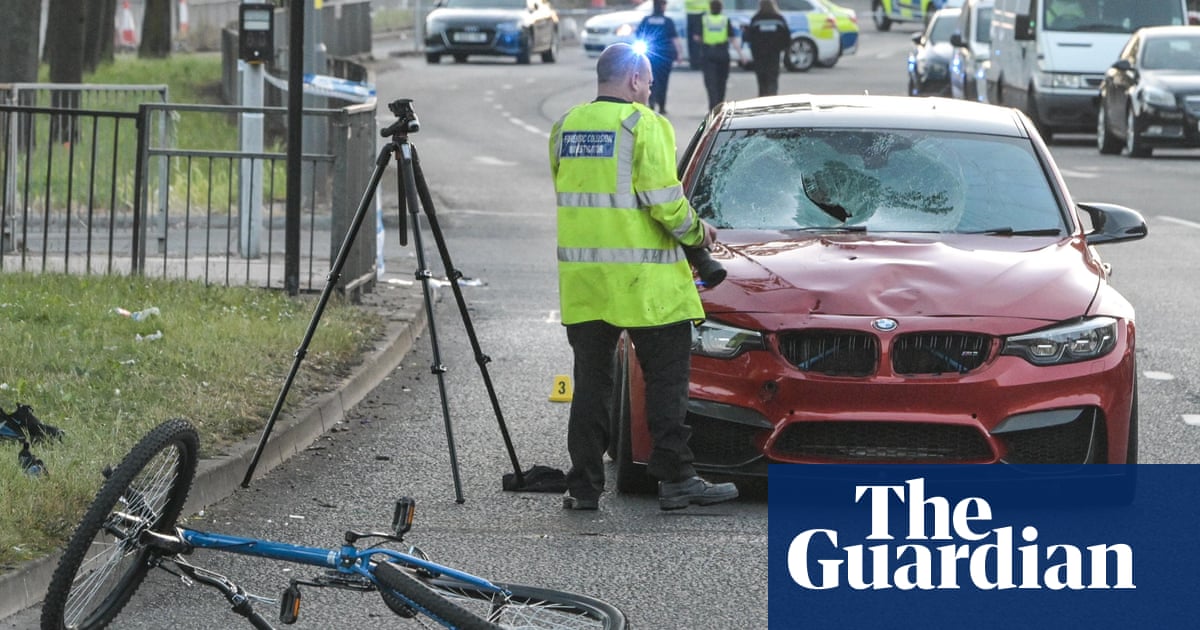
People are holding coordinated protests across UK towns and cities this weekend against what they call a “climate of fear” on the roads, and an “epidemic” of careless and dangerous driving that is curbing children’s freedoms and putting lives at risk.
The protests come amid reports that Rishi Sunak will announce a so-called “plan for motorists” at the Conservative party conference on Monday, which will limit the number of 20mph speed restrictions and favour drivers over bus passengers.
“Parents say they do not feel their children are safe walking and playing in their neighbourhoods,” says Sarah Chaundler, who lives in Birmingham with three teenage children. “There are a lot of people who are angry about this and the impact it’s having on our lives.”
The Safe Streets Now network began life in Birmingham with protests over the summer against speeding and red light-jumping drivers after a string of fatal hit-and-runs. A growing number of groups across the UK are calling for action in their areas, with protests planned on 30 September in London, Birmingham, Manchester, Liverpool, Leicester, Bristol, Oxford, Cardiff, Norwich, Havering and Bedford, and more potentially joining.
West Midlands police have already launched Operation Triton, ramping up efforts to tackle dangerous driving after protests in Birmingham, but residents say more is needed. Protesters are calling for action on dangerous and antisocial driving; safe spaces for children to play, walk and cycle; and “justice for victims of road violence, with perpetrators having their [driving] licences revoked”.
Mat MacDonald is coordinator of Safe Streets Now. Over the summer, he and other concerned parents began collecting data on speeding and red light jumping in Birmingham. Outside one school, in a 20mph zone at home time, they pointed a speed radar at 100 drivers, 91% of whom they say were speeding. “The following week we did a stall outside the school, sharing the findings of our study, with leaflets and posters,” says MacDonald. “We had people getting in touch with us saying: ‘It’s really bad where I am, too.’”
“It touched a nerve,” he adds. One citizen data collection exercise, involving 24 volunteers across the city, logged one incident of red light-jumping every four-and-a-half minutes. Protesters have walked into the road at crossings on the green pedestrian signal holding placards against dangerous driving.
Chaundler, who is a video journalist, interviewed parents beside the A45 Coventry Road in Yardley, where 12-year-old Azaan Khan was killed while riding his bicycle in June. One parent she interviewed said they feared for their lives walking their children to school, and were worried another child would be killed crossing there.
“This is our ‘Stop de Kindermoord’ moment,” says Chaundler, in reference to the “stop the child murder” protests that swept the Netherlands in the 1970s and reshaped policy – and streets – across the country.
Lily Martyn, parent to a six-year-old, is joining the protest on the Plain Roundabout in Oxford, where 35-year-old Dr Ling Felce was killed while cycling in March 2022, and where Martyn commutes by bicycle to work. She says: “We shouldn’t fear that we might be killed every time we get on the roads. Drivers need to be aware when they get behind the wheel that they could kill someone, and they need to behave appropriately.”
The campaign is part of growing calls for action on traffic danger. Five people are killed on UK roads every day, and more than 70 are seriously injured. Despite improvements in vehicle technology, road deaths have fallen just 3% in a decade. A Road Justice report, published this month by the all-party parliamentary group on walking and cycling, made 10 recommendations to tackle road crime, reduce road casualties and support those affected by collisions. This week, bereaved families, with the road danger reduction charities RoadPeace and Brake, launched a campaign to “fix our broken justice system”, highlighting what they call “the failings of the UK justice system” to punish law-breaking drivers.
Alice Ferguson, a co-founder of the campaign group Playing Out, says the protests have captured the concerns of parents across the country. She says: “Parents talk a lot about the stress of traffic danger and having to hold tightly on to their children walking to and from school but they also say it is the main thing stopping them letting their children play outside or having more independence or freedom, and this is confirmed by studies as well.
“Perhaps it’s now reached a moment where people think: ‘It’s not OK actually and we shouldn’t accept it,’ because it’s unacceptable that children are still being killed on the streets where they live.
“It’s horrible to think about, but we have to talk about the fact children are being killed and we haven’t solved this thing – we haven’t made the streets safer. We’ve reduced casualties because we’ve pushed children out of that space.”
MacDonald says the protests are just the beginning. He says: “People are still dying, and people are still engaged in really dangerous driving habits in this city, and in cities across the UK.”












